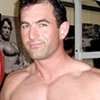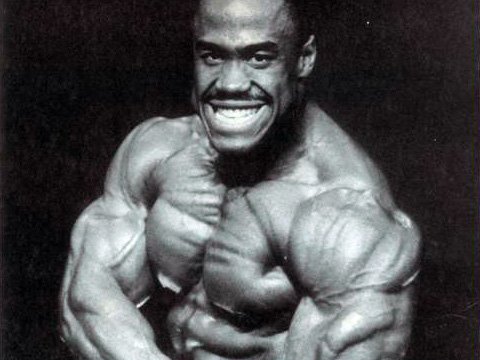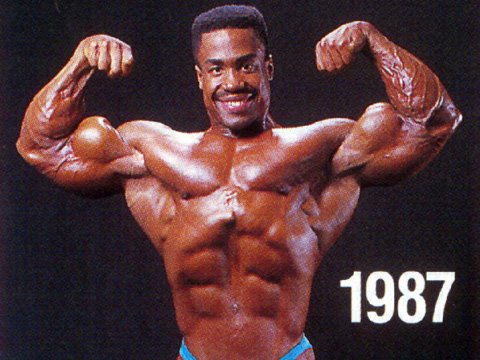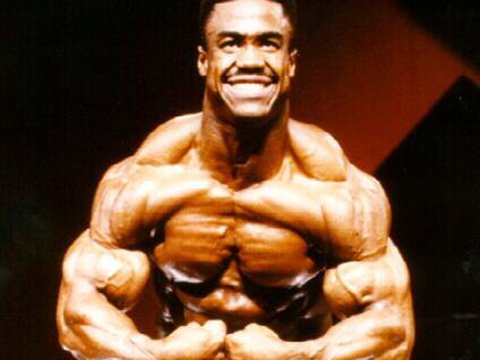| Article Summary: |
|
Competitive professional bodybuilding was, in the early '90s, experiencing some of its best years ever in the face of a new era, which signaled a change in the way its athletes presented themselves on stage and that would establish a platform from which bodybuilding's continued evolution towards staggering size combined with razor cuts would be super charged.
But before gargantuan size would begin to take precedence in earnest, symmetry, presentation, conditioning and balanced mass ruled the stage. Among this category's best was a man called Michael Ashley.
Upon winning the IFBB World Championships Light Heavyweight title and Nationals in 1986, Michael quickly got to work preparing for intensive competition in the professional ranks, with his eyes firmly set on victory.
He did not have long to wait. In winning the 1987 IFBB Detroit Grand Prix he had distanced himself as one to watch. In 1990 he further boosted his professional success rate with a win at one of pro bodybuilding's largest events, the Arnold Classic.
With his Arnold Classic win, Michael Ashley had established himself as one of pro bodybuilding's best. But it was the conditions under which he achieved his pro successes that really placed him in a class of his own: he was, as he claims, 100 percent natural.
But in winning as a pro the hard way his refusal to use any performance enhancing drugs to further elevate his pro status eventually prompted his retirement and, thus, after the 1991 Arnold Classic, where he placed out of the top ten, he was forced to face the realities associated with being drug free.
Having not competed for over 15 years Ashley still has fond recollections on his time on top. Now a sought-after personal trainer he is giving back to those who would like to achieve their own physique goals, whatever they made be. Though away from the pro game for many years he is still, by all accounts, in great shape.
At the top of many 'where are they now' lists, Ashley has finally been found. In this exclusive interview he shares his views on how bodybuilding was back when he was at his best, and how he feels it is today. He also discusses what his historic Arnold Classic win meant to him and his feelings on the contest itself.

[ Q ] Hello Michael. What are you doing these days?
Everything is going good. I have a personal training business here that keeps me busy, and of course I'm staying healthy and loving life. I can't complain about that.

[ Q ] Are you still in shape today?
I'm in very good shape right now. I'm not competing though. Right now I'm about 198 pounds and seven percent body fat, so that's not too bad.
I'm now 50 years old so I'm happy to be able to maintain that kind of condition at this stage of the game.

[ Q ] How does your victory the 1990 Arnold Classic rank compared to other competitive successes you have had as a bodybuilder, both pro and amateur? 
I want to tell you that the Arnold Classic and the IFBB World Championships are, to me, the two most prestigious titles that I've won throughout my whole bodybuilding career.
But I put a little bit more edge on the Arnold Classic because it was a professional show, remembering that I won the World Championships when I was an amateur.
And when we speak in terms of the Arnold Classic prior it being named the Arnold Classic, it was considered the world championships, the professional world championships. Then when Arnold took it over he, of course, called it the Arnold Classic.
To me, when you look at both titles, that one impacted my life more than any other. So I would say the Arnold over the IFBB World Championships.
|
|
|
|
|
|

[ Q ] Were you in the best shape of your career when you won your Arnold Classic title?
Yes I think at my Arnold win I was in the best shape of my life. I think I was leaner than I had ever been when I won the World Championships. But at the Arnold Classic I would say I was bigger and leaner. Throughout my whole career that was my best conditioning.

[ Q ] A lot of contests really do come down to the wire and are very close between competitors of an equal standing. Did your 1990 Arnold win come easy for you? Or were you in a class of your own?
I consider myself to have been in a class of my own in the sense of it being a drug tested event and I was drug free. I know I have been controversial and will continue to be controversial even though I no longer compete. Because there is a percentage of guys who still don't believe I never used anabolic steroids.
So even though I competed in an event and it was drug tested, we all know there were a percentage of individuals who actually failed the drug test that year.
So competing in it I knew that of the top percentage of guys competing that I was one guy that never ever used anything it at all. Of the top five that was in it that year, I know I was the one out of those five who never used anything (laughs).
I'm not disrespecting the other guys, because even though I've been a drug free athlete and I've promoted drug free, I don't knock the guys that do - I think it's a personal thing and a personal choice.
Even though I speak about it it's not like I'm negating their hard work, the effort to achieve the conditioning that they achieved. I'm just saying I'm different.

[ Q ] Did being a natural bodybuilder, as you say you were, pose any difficulties as far as preparing for a contest as prestigious as the Arnold Classic? Did you have to work harder than the rest of the field? 
I think that, yes, I did, and it is definitely universal across the board. It is a lot harder dieting and maintaining that muscle mass and we get very aggressive as the contest approaches because it is abnormal for the human body to go in a certain direction.
I remember I went into the Arnold at around three percent body fat. Now you know that is not normal for the human body. Six to ten percent is considered extra lean for a male so what we do as bodybuilders is we go beyond the norm. So when I go beyond the norm as a natural athlete it is that much harder.
I remember having to ingest calories at an extreme amount. I was up to 5000 calories a day at one point, as a light heavyweight athlete - because I never competed at over 200 pounds. And that was a lot of food. I consumed MCT oils just to help boost my daily calories. But I was extremely happy I was able to do that.

[ Q ] Would that have been more due to an individual metabolic attribute on your part rather than the fact you were natural?
Well natural is one thing but then trying to maintain is another. Because this is one of those things that people asked about me: how was he able to maintain? I would be considered small compared to the guys of today.
Back then, for me to get to 196 to 198 pounds at 5'8" without ever using anabolic steroids and to get into that kind of condition was considered somewhat impressive, so most people questioned whether I was able to pull that off naturally.
| MICHAEL ASHLEY COMPETITION HISTORY | |||||||||||||||||||||||||||||||||||||||||||||||||||||||
|
|||||||||||||||||||||||||||||||||||||||||||||||||||||||

[ Q ] For your Arnold win, did you adjust your training and nutrition programs specifically for this event? 
Well actually I didn't have to do anything abnormal. I used what is called periodization. The Arnold was 20 years ago and a lot of the guys didn't really get into this kind of training back then. And I was fortunate to be exposed to it a lot and used it (periodization training).
You would find strength and conditioning coaches using it with their athletes, powerlifters would use it. But bodybuilders would train somewhat instinctively back then and now instinctive training, as a concept, is supported as an approach.
What I found, though, was that this cyclical training allowed me to go through strength cycles and hypertrophy cycles. And the various cycles allowed me to improve beyond what might be expected with one training approach - you improve in strength, then you take it to a hypertrophy cycle so you can train that much harder with greater loads which was more conducive to adding size.
So my experience was that of a powerlifter getting into bodybuilding and utilizing the various cycles. I think that really made a difference in terms of me being able to hold on to more size and, of course, not being afraid of ingesting the calories. Because most bodybuilders back then were concerned about eating too much, they were scared.
And getting properly monitored and assessing body composition, looking at lean mass to fat ratio, on that basis I was able to prepare for those events without any problems at all, so it worked out very well.

[ Q ] Clearly it did. Considering that winning the Arnold Classic is one thing, following this win with subsequent pro contest victories quite another, did you feel that you had to evolve your training approach to stay on top, following your besting of the 1990 Arnold field?
As we continue to evolve we learn of different things that work even better. I will say that in terms of the actual training approach I stayed somewhat consistent to it.
And, really, when you look at the principal behind it, you look like how you train. You notice that a sprinter is more muscular, a marathon runner leaner because of the excessive continuous repetitious activity, while the sprinter is very explosive.
The thing about bodybuilders is they have often done excessive amounts of cardio. Now when I work with competitors I totally eliminate the excessive amounts they do because it is not really conducive to their sport. Some interval training is going to be more ideal and being more detailed oriented with nutrition is better for power athletes.
We are really not endurance athletes. We have guys talking about doing 45 minutes of cardio a day; those are the things I worked on eliminating as we progressed, and they were still able to get into excellent shape.

[ Q ] When was your last Arnold showing and did this go as you expected it would? 
(Laughs) Well, what happened is that 1990 was the only year they drug tested the Arnold - legitimately, they really came and tested the Arnold field. Of course in 1991 they didn't. What happened was - and this was not made known to anyone - that in preparing for the 1990 Arnold Classic I injured my knee.
As a matter of fact that year - even though I won the Arnold - I was not able to compete at the Olympia. Why wasn't I at the Olympia? Because I injured my knee and was not able to bounce back.
So I went into the Arnold the following year (1991) and was just blown away because once the testing was out it was just a totally different line-up, as opposed to when the testing was in effect.
So the following year I competed and of course was not in the top ten. After that it was just reality: if there was no longer any drug testing and I had to choose to compete without using it then there would be differences in terms of how my conditioning would be.
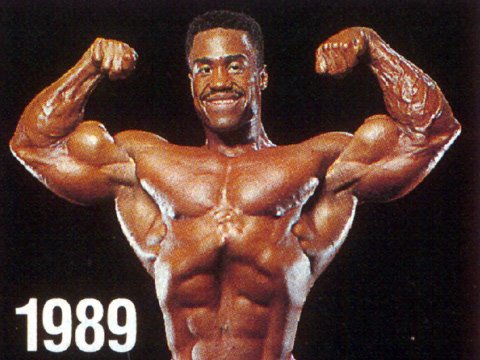
 Click Image To Enlarge.
Click Image To Enlarge.
If I Had To Choose To Compete Without Using Drugs Then There
Would Be Differences In Terms Of How My Conditioning Would Be.

[ Q ] Considering what you have just said, were you at any point in your career ever tempted to take anabolic steroids to stay in the mix and continue winning? 
No. There is one way you can look at it: it was great to compete without it and I chose to stay that way because I did not want to take a chance with the risks. I just didn't want to take that chance so chose to compete without using them.
Because there weren't a lot of pros that were drug free I got a lot of guest appearances and there were many positives surrounding me from just not utilizing it. There is also a market out there that accommodates those guys who don't [use steroids] - more so then than now. Today you don't hear anyone making a big deal about whether a person is drug free or not.
And I always want to be tactful about how I comment on it because I never want to negate a person's success. And we all know that every single athlete that walks out on that pro stage has worked their buts off and credit should be given to them. I could also say whereas they are turbo charged I am not.

[ Q ] People will assess the development you showed on stage when you won your Arnold title and find it very hard to believe you were natural back then. You had the size and conditioning indicative of one who is taking anabolic steroids. Can you understand this level of skepticism?
Well if we look at history there are always a few bodybuilding athletes out there who have made abnormal achievements without the use of steroids or any other kinds of performance enhancing drugs. So it's not like Mike Ashley is the only guy who has ever done it.
Now I will firmly say that even today at 50 years old I can get as ripped up as any guy on steroids. I can say that, but I can't get as big as they do while getting as ripped as they are. So with my level of discipline with my diet I can get in shape with no problems.
The part that really made me controversial was the fact that I was also able to maintain size. Back in my day, when I told people that I ingested 5000 calories a day that was unheard of for bodybuilders of my size because guys just didn't want to go that high. Now we have moved on and evolved and you have heard more about athletes' eating more food.
I was one of the pioneers for ingesting those kinds of calories. Now we know that's conducive to maintaining more muscle mass. To keep that added tissue you must ingest adequate calories while you make those dietary modifications (pre contest). This gives you a much better chance of maintaining mass than the guy who is dieting down using 1800 to 2500 calories a day.
|
|
|
|
|
|

[ Q ] Yes there is a point where additional calories can mean better results, depending on the individual and where they are at in their program. Back in your day was there a significant emphasis on very low calorie diets pre contest?
I would say most guys - and I'm just talking about the pros that I talked to back then - were not eating as much food as I was. At the time I was going to Arizona State University and I was able to get my metabolism assessed and my resting metabolic rate was at about 60 to 70 percent of the calories we ingested on a daily basis.
My rate was around 2000 calories a day. I spoke to my professor and she said, "Well double it to 4000 calories a day." So I did this. When getting my body fat assessed with underwater weighing they determined that I was holding my muscle mass well and that I should try even more (calories). So I was actually able to manipulate my calories even higher.
There was a guy called John Parillo from Ohio and he was a big proponent of MCT oils. After discussing the possibility of using MCT oils we decided I would ingest some additional calories in the form of these. It is a medium chain fat so it acts like a carbohydrate. From using these I was able to bounce the calories up even more. So those things helped me to maintain that size.
And then I trained a lot heavier than most guys. I was a 700-pound squatter. I remember in the '80s I would compete in bodybuilding one week, and then a couple of weeks later would enter a powerlifting meet. Most guys then would say if you were into bodybuilding you shouldn't really be a powerlifter. Nowadays we have some very strong bodybuilders like Chris Cormier.
| RELATED POLL | ||
|

[ Q ] And Johnnie Jackson as well.
Yes Johnnie Jackson, I mean look at those guys. You look at the density on the guys that do lift heavy and you can see it does make a lot of sense.

[ Q ] What prompted your retirement from pro bodybuilding Mike?
Okay, there were two things that affected me. Number one of course was that I had to be realistic. I chose not to use anabolic steroids. Bodybuilding at one point was a hobby, but once I started competing professionally it became more to me.
It was now also a means of making an income. So when I saw that all the professional shows were not drug tested any more, I had to be realistic, because the top five is where all the money is. Anything less than that and you can make an appearance fee but it is not really anything that can justify competing to make a living.
There are athletes that do get endorsement contracts here and there and I had one with Weider also, but it wasn't substantial enough. That was one of the realities of it. And the other thing was that I experienced a shoulder injury and had surgery and in terms of the mobility of that joint, it was just not the same.
So from a posing standpoint - a front double bicep or rear lat spread - it was a battle. I had to finally say, as much as I love the sport and will continue to be a supporter I can no longer sustain this kind of life. I think it is one of the best sports, but as far as being a competitor I had to also be realistic. We can love the sport and support it in various ways.
I speak about it like the Olympic Games as far as bodybuilding is concerned. The Mr. Olympia is a pretty prestigious title but I think the Arnold event itself is a much larger spectacle. I think both shows are great contests but I think the Arnold really does make a statement.
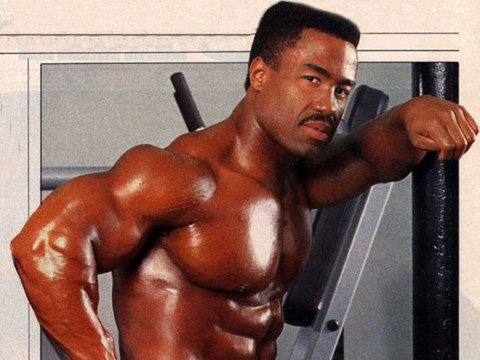
 Click Image To Enlarge.
Click Image To Enlarge.
Bodybuilding At One Point Was A Hobby, But Once I
Started Competing Professionally It Became More To Me.

[ Q ] Just what is it about the Arnold Classic do you think that makes it such a special event, one that many athletes feel is the best bodybuilding spectacle of today? 
Well let's look at it and be fair. Arnold Schwarzenegger came to the United States and won all of his Olympia titles, he became a movie star and a Governor and he really gave back to his sport. And I think between him and Jim Lorimer, they put together one of the most prestigious bodybuilding events of all time.
And then to take it a step further, I have always said that bodybuilding is the foundation of every sport. Some of the athletes today with their big egos might continue to knock bodybuilders and their sport but the truth of the matter is that in any type of training there is something called the hypertrophy cycle.
Every athlete has to go through that cycle, though it is most important for bodybuilders. And for any kind of strength training program, though you are not a competitive bodybuilder you are doing some kind of bodybuilding training whether you want to admit it or not.
And to see Arnold accomplish what he has and the fact he has always given back to sport has made him somewhat what he is today. His notoriety, his publicity, the movies, I think a significant part came from what he accomplished in bodybuilding.
Now I'm not negating the fact that Arnold is a very driven man - there is no mountain too high for him to climb - with all that said I will also say that to be where he is today and to continue reaching out to the sport of bodybuilding really says something.
And now consider the fact that the Arnold Classic takes ego out of it and really embraces other sports because when we look at the Arnold Classic weekend it is not about bodybuilding alone, it's about a significant number of sports and that says something about bodybuilding itself. It has now opened its arms to all other sports.
So the Arnold Classic may have a number of sports today but I'll guarantee you that next year they will have more and so on the year after. I competed 20 years ago! The show is now 20 times larger! So no matter who goes to the Arnold Classic they cannot negate the fact that it originated from bodybuilding.

[ Q ] And when you competed at the Arnold there were just the women's and mens bodybuilding events.
Exactly. It was considered a large event - it was the second biggest, with the Olympia being the largest - and today, though it doesn't have the most prestigious title, it does carry the most prestige in terms of what it has become for bodybuilding.

[ Q ] As far as you can remember, how well was the Arnold Classic run during the years you competed in it?
I know the promoter who promoted the Olympia back then is different to the promoter today. I know Robin Chang did a great job running the 2009 Olympia so I'm not negating the promoters. I know number of guys including myself talked about why we loved going to the Arnold. There we were really treated like stars of our sport.
You go to your room and there was a jacket, sneakers, and a microwave. Now that is all being done today, but let's go back 20 years ago. When you went to the Arnold Classic you felt special. It's one thing to be a competitor but its something else to be acknowledged.
It's 20 years ago that I competed in the Arnold Classic. I went there and called up Jim Lorimer and it was if I competed yesterday. I had the same treatment I got 20 years ago, if not better.
They wanted to make sure I was properly accommodated. "Mike, I'm sending you tickets to go to the after-party with all of the pros." That says something and I personally feel that as large as the sport continues to grow and the whole organization behind it, Jim Lorimer and his team - all the people that are involved who have continued to support the athletes - have made it what it is today.
There are buses to make sure people get to their hotels, to the various venues, so I think there is a lot of return on investment for the participants, whether they are athletes or spectators. You get that welcoming feeling and I'm sure Columbus Ohio really loves the idea too because it boosts their economy, like any large event.

[ Q ] Would it be fair to say, do you think, that the Arnold Classic is consistent in how it is run, that the event itself is the same as it has always been, the only difference now being that it is much larger? 
Thank you, that is the best way to say it because I felt special competing there 20 years ago and I'm not just speaking Michael Ashley, I'm speaking numerous competitors. A common thought is that you are just treated so well each time you go to the Arnold.

[ Q ] Many have said the standard has improved among those competing in the Arnold Classic today. What are your views on the competition of today versus that of the '90s, when you were in your competitive prime?
Today we have the land of the giants, the cartoons. I'm not knocking these guys - they are huge. I'm not pointing fingers at the competitors themselves; it actually seems that society has accommodated the notion that the bigger and leaner you get, the better it is. So no matter how great the guys of today are, people are always looking for more.
The fans are paying for tickets to see these enormous guys so it just continues to evolve. But, relatively speaking, it was very competitive then, just a different breed of bodybuilder.

[ Q ] The competitors of your era weren't exactly small either.
Yes they were pretty big, but and we all know that whether it is in track and field, baseball or basketball we can all see that the athletes in the last 20 years have all evolved too. And it has happened in bodybuilding also.

[ Q ] But what exactly has evolved? Has a competitor's genetic abilities expanded or is it the training methods, nutrition and drugs that are responsible for pro bodybuilding's continued evolution? Has the genetic pool really become that large?
I wouldn't say the genetic pool, but the guys today are willing to experiment at greater levels than yesterday. And I think the competitors of today are being supported by more in terms of science. We can see that guys 20 years ago and even further back basically tried what they thought worked for them.
There is a lot of research now that supports the ideal way to train and eat and, of course, there are a lot of drugs out there. I don't want to talk about bodybuilding being a drug-oriented sport because whether the world wants to accept it or not, you name the sport and I can tell you that there are drugs that exist there.
Just because bodybuilders are more abnormal compared to the everyday individuals it is more visible, and that's why people associate drug use with bodybuilding. But it's in all these sports.

[ Q ] Being one of the most successful pros of the early 90s, what was it about your physique the judges liked most do you think?
I think I was fairly symmetrical and that was very important. My stage presence was very good as far as presentation because you know you can take a physique that has a couple of weaknesses here and there and as long as they are not glaringly obvious to the judges you can move on. So I think I basically put my best foot forward.
When I stood onstage and they asked for a front double biceps, I made sure it was a pose that really showed the best of what Michael Ashley had to offer. And I had some freaky body parts.
My abdominal muscles were considered among the very best in the business and my hamstrings were also good. Some body parts that stood out yesterday that today would probably just be the norm (laughs).
You look at the guys of today and you name the body part and it will be very impressive. But for that era I felt I had the package: at 5'8", competing at 196 to 198 pounds. I remember Shawn Ray and myself battling.
We had very similar physiques but of course Shawn Ray was a little thicker and shorter than myself. But I think going out on stage and being able to show them very detailed muscle and symmetry in sync to music made me a top competitor at the Arnold Classic.

[ Q ] Shawn Ray was also known for his great presentation. Is this aspect of competition very important do you think?
Yes I really do and I don't think the guys of today present themselves as well as those from the past. The guys from the past put a little more into posing than they do today. That I will say. But the guys today, across the board, are really freaky. So people are more willing to excuse their presentation as they are just so in awe of the muscularity and definition that they show.
If you look back to my era, and further, posing was really important. You look at guys like Lee Labrada, Bob Paris, Shawn Ray and I - we really spent a lot of time working on our routines so they were something that really impacted the audience, along with our physiques.
Now I'm not saying that some of the guys don't do it today but you often see them just going out throwing shots and raising their hands and hoping for audience approval as opposed to just perfectly presenting themselves and generating the screams from the audience as a result of the way their muscles are displayed to the music.
Why do you think an athlete needs to walk in front of the audience at the front of the stage asking for their approval by moving their hands? You can get the same effect if you work on your presentation more.

[ Q ] The phrase 'shock and awe' comes to mind. When a bodybuilder relies on the immensity of his physique rather than the artistry of his posing to impress the audience. 
Yes, exactly. Sometimes I'm watching and I think to myself if only that guy had a more impressive routine - and I don't want to call names.
Even at last year's Olympia I saw some great physiques with really sad presentations and I'm like, "Guys, you have spent all this time getting on shape, at least get a great routine."

[ Q ] On that note I would like to thank you Michael for presenting me with some great insights into your life as a competitive pro. 
Thank you David, the pleasure was all mine.
